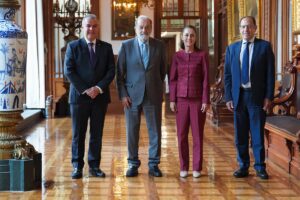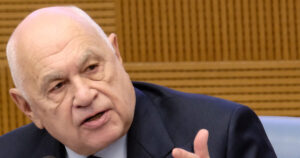
Immigration controls at Argentine border crossings will no longer be in civilian hands. Javier Milei’s government announced on Tuesday the creation of a National Migration Agency that will report to the Ministry of Security and not the Ministry of the Interior, as is currently the case.
The new department will coordinate the work of all security forces, such as the Federal Police, the Airport Police and the Gendarmerie, in the fight against transnational crime. The ultimate goal is the creation of an immigration enforcement force modeled after the U.S. Border Patrol, which is now a key component of the border enforcement model promoted by President Donald Trump.
The official launch of the new agency was Patricia Bullrich’s last official act before leaving her post as Minister of Security to take office in the Senate. Bullrich, an advocate of a tough approach to crime, will be replaced by her deputy, Alejandra Monteoliva, thus ensuring the continuity of her policies.
Milei loves to talk about the “Bullrich doctrine”, which he attributes to the end of road and motorway blockades as a form of social protest. In a second phase, the Casa Rosada promoted the replication of US security agencies in Argentina, a country that, through Trump, has become the economic backbone and ideological mirror upon which Milei’s libertarian government looks.
Milei’s attraction to Trump and everything associated with the United States even led him to propose the creation of an Argentine FBI. During a speech last June, he promised a reform of the federal police that would allow the agency to make arrests or conduct espionage activities without judicial authorization. The reform announced on Tuesday is also inspired by US security models, albeit with economic resources light years behind and very different realities.
The new agency, the government said in a statement, “will streamline border coordination, policing and migration intelligence to address transnational threats. Given the region’s critical violence and criminal displacement, border protection has become a national security objective, not merely an administrative one.” According to Minister Bullrich, Argentina “has managed to keep the main (transnational) gangs under control”.
“Today we need to transform this National Directorate (of Migration) into a National Agency, which comprehensively addresses all the migration issues we have in our country,” he added.
In any case, this represents a paradigm shift, because historically immigration was under the Home Office. Bullrich obtained the transfer to the Ministry of Security thanks to an agreement with Karina Milei, Milei’s sister and general secretary of the Presidency, currently the most powerful person in the government.
The same paradigm shift was applied by the government when, over the weekend, it appointed a military officer to head the Ministry of Defense, a portfolio that had been in civilian hands since Argentina’s return to democracy in 1983. The government made clear that its intention is to “put an end to the demonization of our officers, non-commissioned officers and soldiers” who, according to the renewed reading of history promoted by the far right, suffer the heirs of those convicted of crimes against humanity committed in recent dictatorships.
Sign up to our weekly newsletter to get more English-language news coverage from EL PAÍS USA Edition





